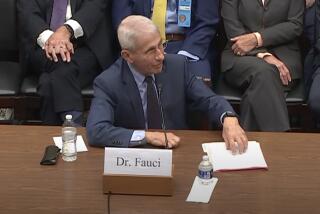Father Misled on Dangers of Son’s Therapy, He Says
- Share via
WASHINGTON — His voice trembling with emotion, the father of the teenager who died during a gene therapy experiment in September told a rapt Senate subcommittee Wednesday that the University of Pennsylvania scientists who conducted the research oversold its potential benefits and underplayed its risks.
A disillusioned Paul Gelsinger of Tucson told senators he had come to the painful conclusion that he was “fairly naive” to have trusted the study’s principal investigators, one of whom had a financial interest in the new treatment.
“It looked safe. It was presented as safe. I encouraged my son to do this,” Gelsinger told the Health, Education, Labor and Pensions subcommittee on public health at a packed hearing on federal oversight of gene therapy. “But I wasn’t given all the information. And some of the information I was given was not true.”
Gelsinger’s comments, made with two of his lawyers sitting nearby, marked a significant shift in tone from previous statements of support for the doctors who led the experiment--a change of heart he attributed to recent revelations about serious safety lapses by the research team.
The hearing, called by Sen. Bill Frist (R-Tenn.), was the first to address the quickly growing field of gene therapy since 18-year-old Jesse Gelsinger’s death, and it came just two weeks after the Food and Drug Administration shut down Penn’s gene therapy program for lapses the agency uncovered there. The hearing also addressed recent revelations that many gene therapy researchers have not been properly reporting deaths and illnesses of study volunteers to the National Institutes of Health.
Regulation of gene therapy “is not working, it is failing,” said Frist, a heart surgeon, at the close of a four-hour hearing that included lengthy questioning of government overseers. “Now we have to decide what we’re going to do.”
Representatives of the FDA and the NIH told the subcommittee they are searching for ways to improve public accountability in the 10-year-old but still unproven field, which shows great promise for treating diseases by changing people’s genetic makeup. They told the committee they have no explanation for the agencies’ recent discovery that just 39 of the 691 deaths and illnesses suffered by volunteers in one type of gene therapy experiment over the last seven years were reported to the NIH promptly as required by federal rules.
More to Read
Sign up for Essential California
The most important California stories and recommendations in your inbox every morning.
You may occasionally receive promotional content from the Los Angeles Times.













